
Fossils uncovered recently in the Arctic support the idea that dinosaurs died off rapidly — perhaps as the result of a massive meteor hitting Earth. The finding contravenes the idea that dinosaurs were already declining by this time.
Geological evidence indicates that an impact occurred near the Yucatán Peninsula at the end of the Cretaceous 66 million years ago. But whether the event created an all-out apocalypse that wiped out the dinosaurs is still a matter of debate. Despite many species dying out, many others survived, including mammals and the small feathered dinosaurs that were the ancestors of today's birds.
Some palaeontologists suggest that non-avian dinosaurs were in decline before the impact — perhaps as a result of major volcanic events or global cooling.
Now, reporting in Naturwissenschaften1, Pascal Godefroit at the Royal Belgian Institute of Natural Sciences and his colleagues describe fossils found in northeastern Russia that suggest dinosaurs were not in decline at all. Although dinosaur fossils have already been found in the Arctic, the new find is unique because of its age: Godefroit and his team have dated the beds at between 68 million and 65 million years old — just before the time of the extinction.
"We found that there is no indication that the biodiversity of dinosaurs decreased just before the [extinction] event," says Godefroit. The team found that herbivorous, duck-billed hadrosaurs and velociraptor-like bipedal theropods seem to be as common as they were in other parts of the planet at the time. Along with this discovery is the presence of the first dinosaur eggshells found in polar regions, hinting that the dinosaurs were residents rather than migrants.
For more information related to dinosaurs, visit rareresource.com.

0 comments:
Post a Comment